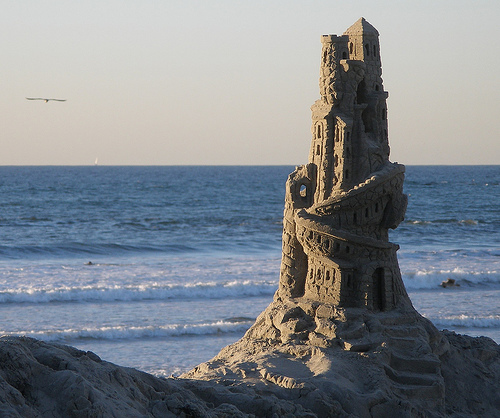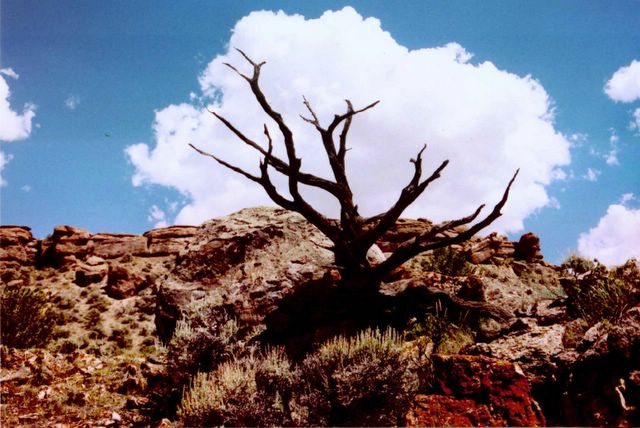About 12 years ago, I had a vision of how we relate to God/the Ground of All Being in a sort of visual metaphor that encapsulated many different approaches. Basically it posited that God was the Ocean, and the way that we relate to that Ocean typifies many different ways of relating (or not) to God.
Some go out into the water and snorkel or play water games with others. They are in the Ocean, with their feet in the mushy sand, and enjoying the sway and rocking of the waves, but their attention is also on the company around them. I would interpret these as those devotees who are involved in a relationship with God, but also with the “community of faith.”
 Some go out into the water and kick up their feet and float. They let the power and volume of the Ocean support their weight, and the water covers their ears. They stare up at the sky and float on the waves until they truly feel at one with the Ocean. These, in my interpretation of the vision, are the mystics who experience transcendence.
Some go out into the water and kick up their feet and float. They let the power and volume of the Ocean support their weight, and the water covers their ears. They stare up at the sky and float on the waves until they truly feel at one with the Ocean. These, in my interpretation of the vision, are the mystics who experience transcendence.
Some go out into the water, and either enjoy the frolicking with others or kick up their heels for a few moments, and then feel an overwhelming urge to go back out of the water and try to get others to join them. I would call these “evangelists” or “bodhisattvas.”
Some go out into the water to swim against the incoming tide. They test their own bodies against the power of the current. These are the religious athletes or ascetics.
Some have surfboards, and ride the waves of the ocean and interpret its motion in artistic jumps and speeding crescendos. This is how I see artists such as Bach or Dali or Hokusai or Bob Marley.
Of course, on every beach, you have some who just don’t go in the water.
Some walk along the shoreline for miles and miles, content enough to walk along the wet sand in their bare feet and roll up their pants so that the occasional wave can wash their soles of the little granules stuck to their feet. I would call these the religious dabblers who wander the great expanse of the shoreline, but never find anything compelling enough to take off their clothes and dive in.
Some sit on the beach (in their favorite spot) and admire the Ocean without ever going in: I would call these the people who like the idea of God, maybe they attend religious services, but have never had an experience of the Water. They’ve never really “felt” God.
Some feel the need to watch after others' safety in the water. They are the self-appointed “lifeguards” of the Ocean.
 Some take the wet sand (earth infused with the Ocean) and build intricate castles, large and small. Some invite others to come and play in their sandcastles, some guard their sandcastles very jealously—worried someone is going to come around with the intention of destruction. Perhaps they may run out and jump into the waves every now and then to cool off, but their attention is primarily on the sandcastles. I would say these are the architects and attendants of religious structures. Primarily concerned with the construction and preservation of structures infused with the Ocean—but not the Ocean itself. (And what is it that Jimi said about sandcastles? J)
Some take the wet sand (earth infused with the Ocean) and build intricate castles, large and small. Some invite others to come and play in their sandcastles, some guard their sandcastles very jealously—worried someone is going to come around with the intention of destruction. Perhaps they may run out and jump into the waves every now and then to cool off, but their attention is primarily on the sandcastles. I would say these are the architects and attendants of religious structures. Primarily concerned with the construction and preservation of structures infused with the Ocean—but not the Ocean itself. (And what is it that Jimi said about sandcastles? J)
Some are so fascinated with the intricate life within the coastline and beach that they turn their back to the Ocean and have no interest in it. Some are so involved in the deep mysteries of each granule of sand that they have dug deep trenches down into it, ready to discover more and more. They have dug down so deep, in fact, that they no longer see the Ocean at all—and some of them say to each other, “Ocean—you believe in that hullabaloo?” But the deeper they dig, the closer they get to the water that has seeped under the sand. And they may believe they have found something new, but it will of course be the Ocean.
And then there are all those who ignore the ocean entirely. They are sitting in traffic on the 405, because there have so many important things to do.
Where do you see yourself in this metaphor? Or is there another way that better describes your understanding of God?










